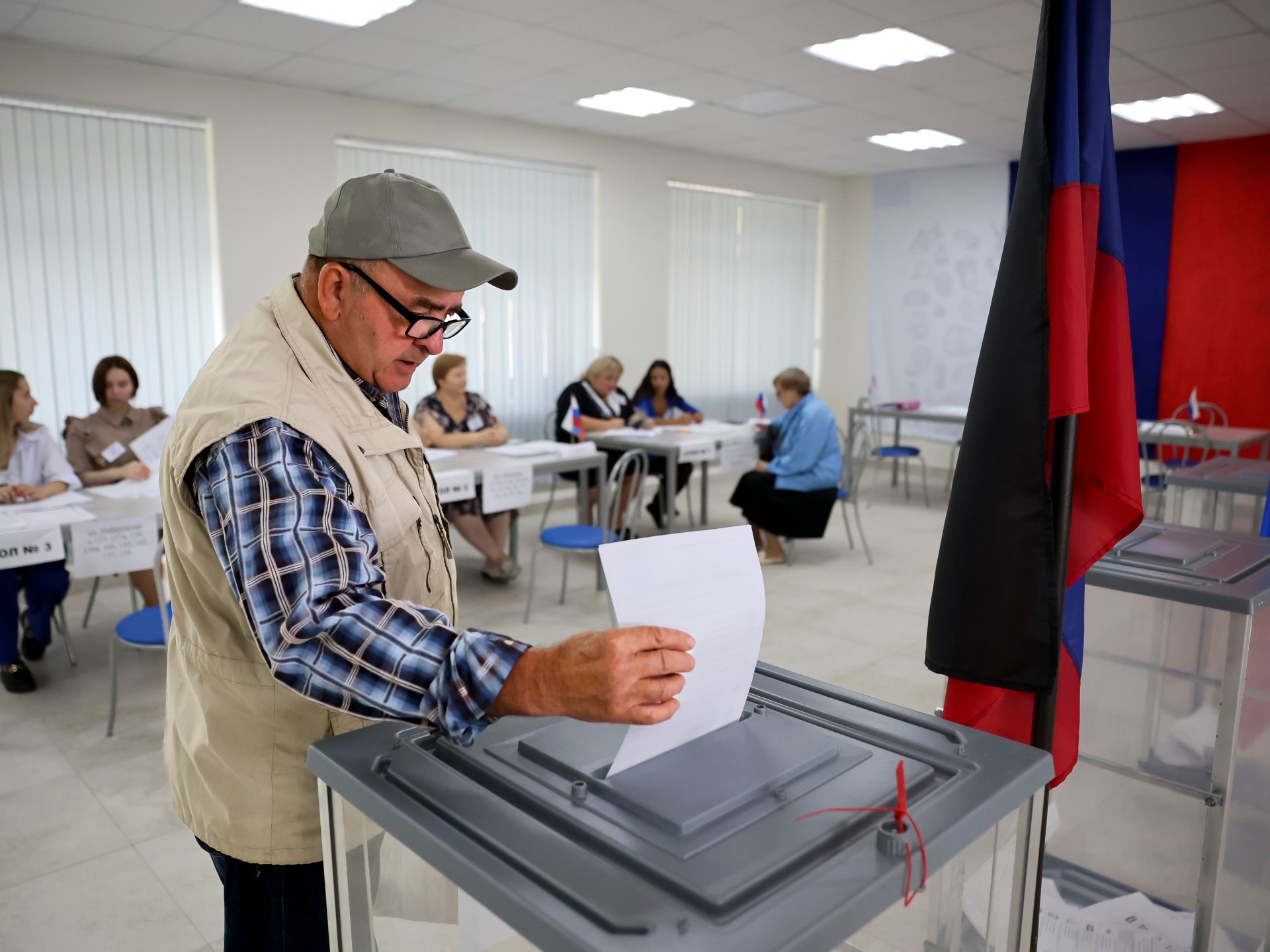Russia has wrapped up widely condemned regional and municipal elections, including in four eastern regions annexed from Ukraine, delivering strong support for President Vladimir Putin.
The week-long polls, which wrapped up on Sunday, took place amid criticism of vote rigging and Ukraine’s push to reclaim its territories.
The Council of Europe, Europe’s leading rights group, called the polls a flagrant violation of international law, while Kyiv and its allies said they were an illegal attempt to tighten Moscow’s grip over regions in Ukraine’s south and east.
Data published by Moscow and proxy officials showed voters in Ukraine’s war-battered regions of Donetsk, Luhansk, Zaporizhia and Kherson had backed Putin’s United Russia party with more than 70 percent of the ballot in each territory, state-run news agencies reported.
Detailed voting figures were not immediately released.
All but a handful of Russia’s allies recognise the regions as part of Ukraine.
The results mean that Moscow’s handpicked governors in the territories, a mixture of veteran separatist bosses and small-time local pro-Russian politicians, win full terms in office.
None of the four regions are fully controlled by the Russian army.
Ukraine, which in June began a gruelling counteroffensive to liberate the lands, has been slowly regaining territory in the Zaporizhia region and has also claimed some advances in Donetsk around the shattered city of Bakhmut.
Dmitry Medvedev, a former Russian president and leader of United Russia, thanked all voters who turned up to cast their ballots in the annexed regions.
“We value votes of all voters, but, probably, people living in our new territories … their votes have an absolute significance for our party,” he was quoted as saying by the TASS news agency. “This is not a mere mandate of trust… to a certain extent, this is an act of civic courage indeed and our party should treat it this way.”
Across Russia, United Russia won every provincial governor’s race it contested. In the regions voting, however, electoral competition was limited as strong candidates, including some from Russia’s main opposition Communist Party, were blocked from running by authorities.
All significant, legal political forces in Russia, including the patchwork of opposition parties that provide a semblance of competition at the polls, are broadly loyal to Putin and his 18-month-old war in Ukraine.
‘Not real elections’
Stanislav Andreychuk, co-chair of Golos, a voter rights group designated a “foreign agent” by the Russian government, said instances of vote rigging in many parts of Russia showed that “these are not real elections”.
Andreychuk said his organisation had received reports of opposition candidates being detained, having their cars vandalised and, in one case, military draft papers being served to election observers.
“They are doing some absolutely unthinkable things”, he said.
But the Kremlin said elections were free and fair in Russia and that opinion polls and numerous election wins show that Putin is by far the most popular politician in the country.
Among the regional chiefs re-elected was powerful Moscow Mayor Sergei Sobyanin, a close Putin ally.
With virtually no opposition, early results showed that Sobyanin took more than 75 percent of the vote in the Russian capital, considered among the most opposition-leaning parts of the country.
In 2013, Sobyanin was almost defeated by anti-corruption campaigner Alexei Navalny. The opposition politician, who was jailed in 2020 on old fraud charges his allies say were a pretext to end his political work, dismissed the vote from behind bars.
Before the election, Moscow residents had praised Sobyanin for modernising Europe’s largest city. The Kremlin loyalist – who has been in office since 2010 – has presided over numerous mega-projects that have transformed Moscow’s skyline.
“Moscow is blossoming in front of our eyes,” 21-year-old student Rukhin Aliyev told the AFP news agency.
Musician Kirill Lobanov said Sobyanin had done “very well” as mayor, particularly “in the last year” marked by the conflict.
Kremlin critics have said that elections in Moscow are easily rigged due to the capital’s system of electronic voting, which they say is impossible to audit.
Similar systems have been rolled out in many other Russian regions.
Observers say one of the few competitive races in Russia’s 11 time zones emerged in Siberia’s remote Khakassia, where Governor Valentin Konovalov is seeking re-election.
The 35-year-old Communist defeated a Kremlin-backed candidate in 2018 after a wave of rare protests in the sparsely populated mountainous region.
In this year’s campaign, he initially faced Moscow-backed candidate Sergei Sokol, who portrayed himself as a Kremlin-decorated “hero” who fought in Ukraine.
Sokol dropped out at the last minute, citing health reasons.
Konovalov is one of few regional leaders not backed by the Kremlin who remains in office.
